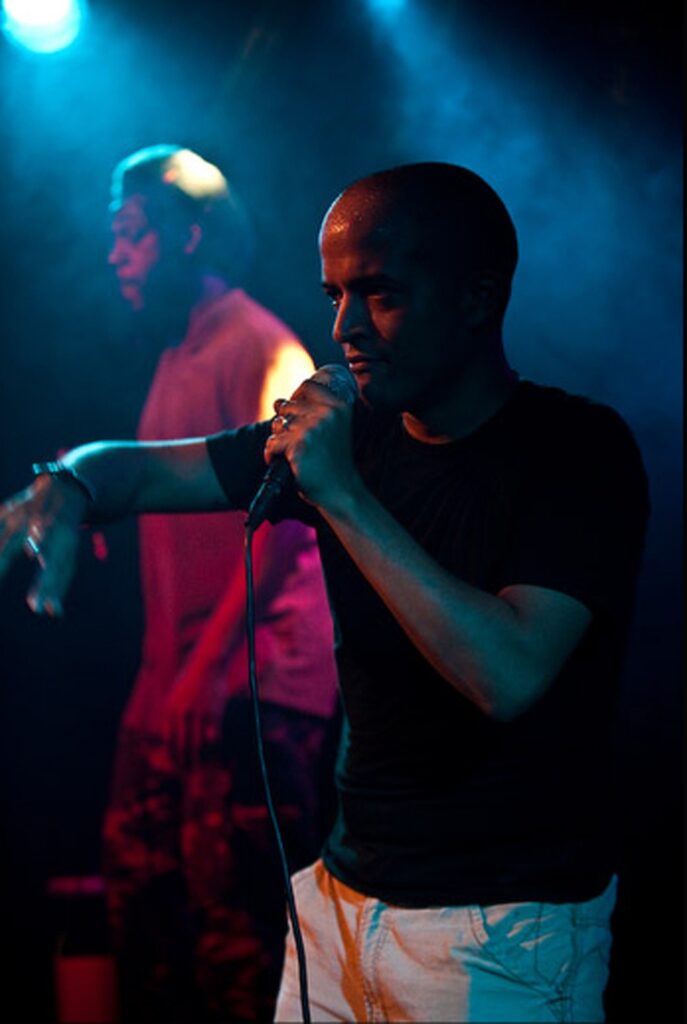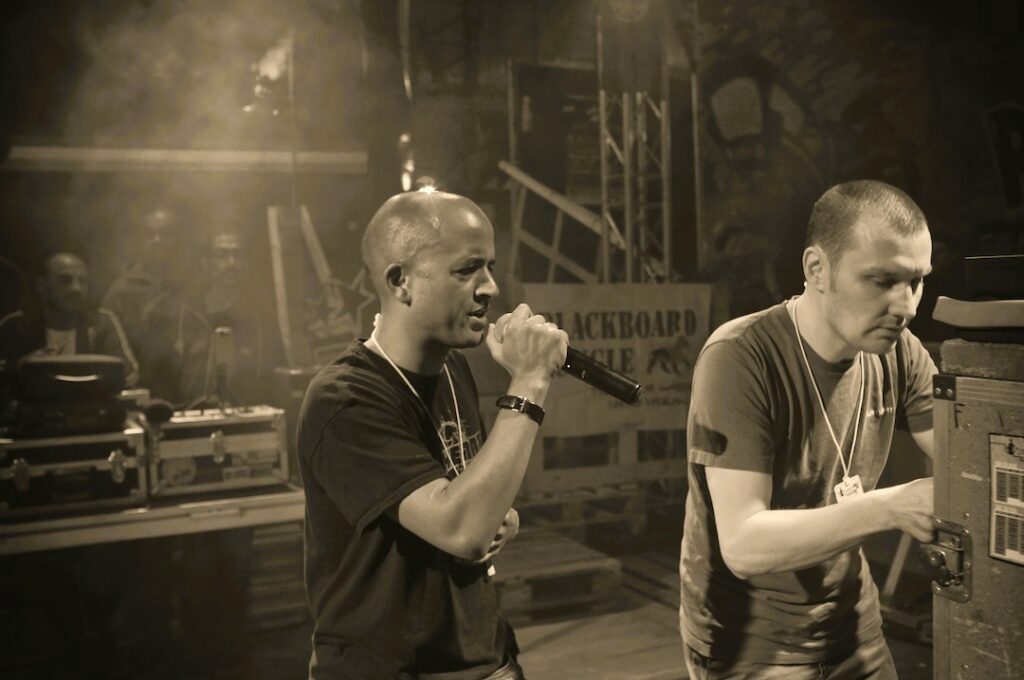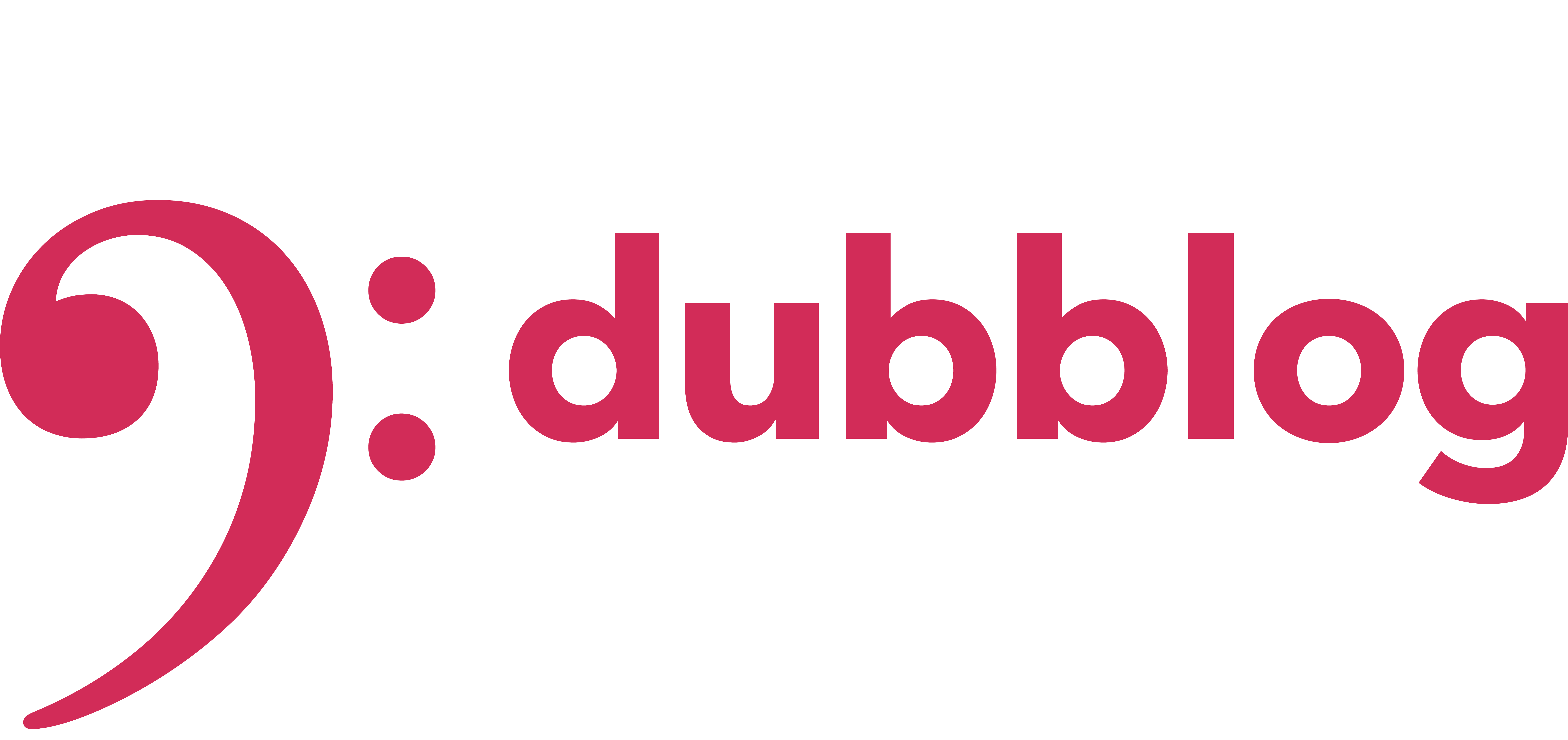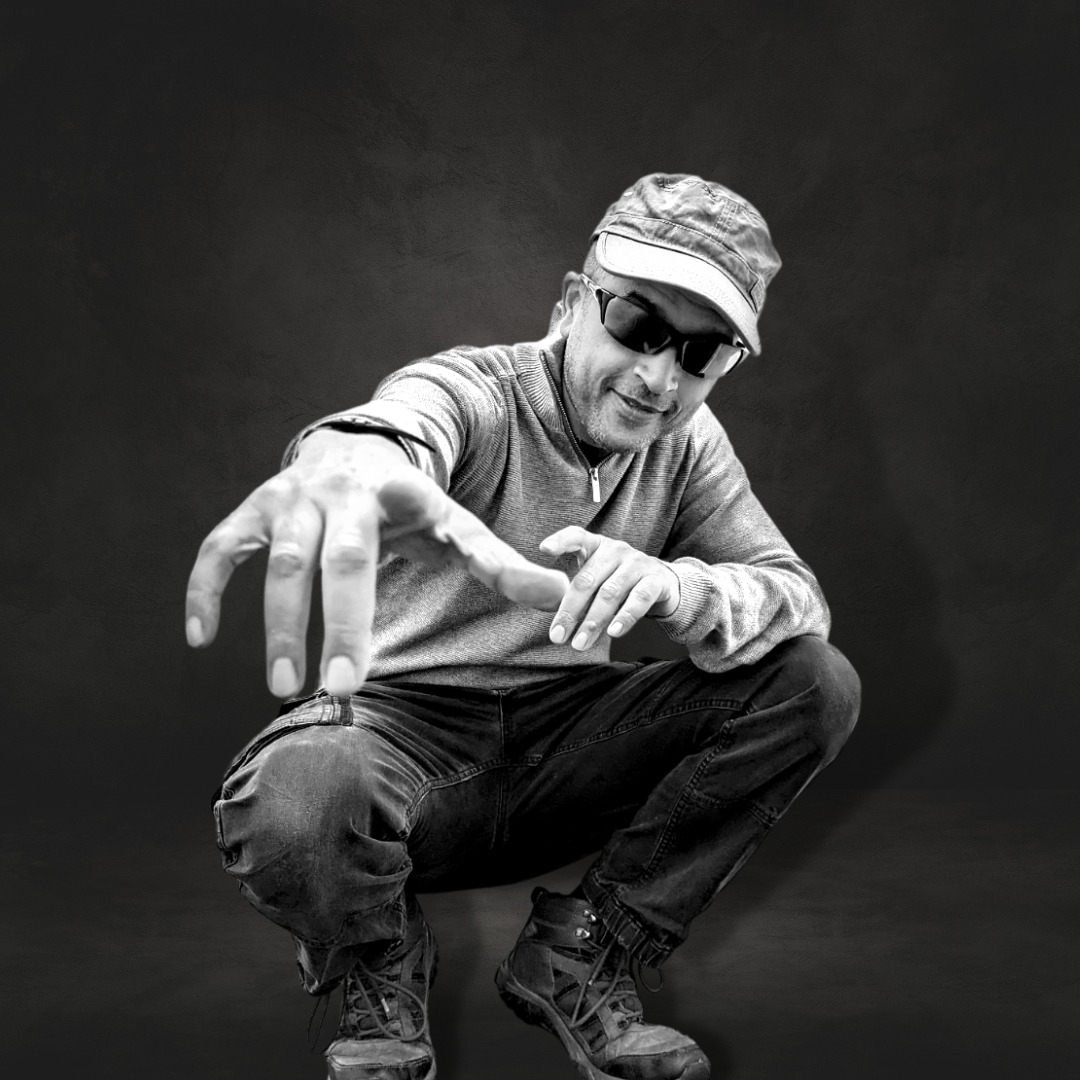Your name: Paul Fox
You live in: Southampton, UK
Title of your last album: Standing Dub
What is your personal definition of Dub?
For me, a dub is nearly always a dub version of a vocal tune. This means that the dub is another version of the original song that breaks down the tune into component parts and focuses on certain parts at certain times. The dub will also inevitably incorporate echoes and other effects to make it more ‘out there’ than the original song. At other times, dub is a mixture of rhythm and effects to produce an interesting and hypnotising version of a song.
What makes a good dub?
To me there is no definition of what makes a good dub. If there was a formula to make good dubs then once you know the formula, all of your dubs would be great! So I feel it is always about the end result. Does the end result feel good to your ears and body and soul? If it does then you have made a good dub. Sometimes it may be a hardcore steppers dub or it may be a very mellow chilled dub. As long as it ‘feels’ good then it is good! This may be different to every listener.
What aspects of dub music fascinate you the most?
Having listened to dub music for about 40 years and having been making dub music for more than 30 of those years, the aspect of dub music (and any kind of music) that fascinates me is something about it that sounds really interesting. This could vary from one dub track to another. It could be something like a very strange sound that is being used which works really well or it could be some amazing musicianship like incredible drum playing or a fantastic flute solo. It could be the original use of an effect on something that catches your ear. Basically, the thing that fascinates me the most now after all of these years is something that draws me to the dub because it is interesting and original.
How did you discover your passion for Dub and how have you and your music developed since then?
Simple answer – Jah Shaka. When I first started listening to reggae music, I enjoyed the dub versions but did not really pay much attention to them. However, when I first went to see Jah Shaka Sound System I was completely blown away and fully appreciated the beauty of dub music and the places it could take you to in your mind. I started making reggae music and dub after going to some Shaka sessions and my music has developed a lot since then. For many years I think that I was so heavily influenced by sound system culture that I believed dub music should be created with sound systems in mind. The way my music has developed is that I no longer think in those terms and I am totally free to make whatever kind of reggae and dub that suits me. I listen to a lot of genres of music and now I like to incorporate other flavours into my music which keeps it interesting for me and hopefully for other people too.
What does the process of creating a typical Dub track of yours look like?
As I said, the dub nearly always starts life as a vocal track first so the process usually starts by loading up a song that contains vocals. If the individual tracks (drums, bass, chops etc) are already quite produced (EQ, compression, effects and so on) then I will think about what needs to be different in the dub to distinguish it from the vocal version. This could mean changing the EQ on the kick drum to make it sound heavier than the original version if that is what the track needs. Or it could mean changing the levels slightly because I want the focus on something different. Then I will choose the right effects and decide if I need any new sounds that were not in the original song. Before doing an actual mix I will just play the dub through many times mixing as I go and making a mental note of the things that work well and the things that don’t. I will also be aware that if the dub is part of an album, then I must make sure that the mix fits in with the album. So in other words, to keep the album interesting I do not want every dub to start with the same kind of intro like just chops and a melody before the drums and bass come in. There should be a variety of approaches and some dubs may start with all of the sounds or just drum and bass or just vocals and chops.
When are you satisfied with a dub track you produced?Almost never! But at some point you have to admit that it is probably not going to end up sounding noticeably better the longer you spend on it and also you have to keep interested in it yourself. If I worked on one dub for a year solidly then it might sound really great but it is more likely that I would have lost interest in it and that would be heard by the listener. If I feel quite excited about a track then I want to stop working on it when it has ‘peaked’ in terms of how good it sounds to me.
What is most important when producing dub?
The same thing as working on any kind of music – make sure that I like it and would want to listen to it and make sure that it is interesting to the ear.

You also sing yourself. When do you decide to turn your production into a song and when do you just stick to dub?
I nearly always start a track assuming that I will sing on it or someone will sing on it. I have released a couple of dub only tracks over the years but this is very rare. This usually comes about because I have a concept that I like. For instance, I released a dub called Roots Rock because I wanted to make a sprawling long song (nearly six minutes) that had horn solos, guitar solos and other sections a bit like Journey to Addis by Third World. In fact the b-side of my first release was called African Mask and was about 8 minutes long I think and was a similar concept of a long sprawling track that took you on a journey but that one changed into even more of a dub version halfway through.
Basically asked: Do you like songs or dubs better? Why?
Instinctively I would say songs but there are definitely times I prefer the dub version of a song. I think that some dubs are so classic that they outshine the vocal version such as ‘King Tubbys meets Rockers Uptown’ even though the vocal version is amazing. Similarly I prefer ‘Your Teeth in my Neck’ by Scientist to the vocal version even though I love the vocal version. I think overall I like hearing a good vocal followed by a good dub version which sort of makes the experience feel whole. The reason I probably prefer vocals is because that is where the journey normally begins for me and the feeling I get from the song is what initially pulls me in.
What is your special strength?
I wish I had one! I am not sure what my strength is. Maybe it is to keep producing new music regularly for 30 odd years without getting bored.
Which album do you consider to be your best?
This will depend on what mood I am in. But it would probably be one of my recent albums such as Imaginary Lines, Same Blood or Standing Tall and their dub versions. The dub album of mine that I usually listen to the most is Dub Blood, the dub version to Same Blood. But with Standing Dub being released recently I am also leaning towards that one. The reason I like these albums and their dub versions is because I created these works without feeling like I should be making sound system music – I just wanted to make good, interesting and original music. So these are my most varied albums.
Are you able to make a living from music?
No. I wish I did but I have never made that much money from music and I have to work a ‘normal’ job to support myself and my family.
What aspects of producing music do you enjoy the most?
I think in very general terms I enjoy the journey the most. That is to say that I like having a concept in my mind and then seeing where that takes me in terms of sound choices and other aspects. It is a great feeling to sit back and listen to the last few hours of work knowing that before that, this idea had never existed. It is very satisfying when all things come together and the end result is sounding good to my ears. Nowadays I tend to get guest singers and musicians on nearly all of my tracks. I do this because I like having other influences other than just my own on a track to keep it interesting. So when a drummer sends me his files or a guitarist sends me his files, it is a great feeling to bring all of their work and my work together to produce something new.
What do you dislike in the studio?
The one part of the process that I like the least is writing lyrics. I have written literally hundreds of songs. When I release an album, it will usually be around 12 tracks picked from up to 30-40 tracks that I have written in that period. So coming up with new lyrics and melodies after writing for over 30 years is a challenge especially because I want songs to sound new and original.
When you’re not working on Dubs, what do you like to do most?
I like to listen to lots of different kinds of music. I also love a good movie!
What music do you listen to besides Dub?
It is probably easier to say what kinds of music I do not listen to! I like pop, alternative pop, dancehall, rock, progressive rock, hip-hop, rap, Afrobeats, singer-songwriter, soundtracks, punk music and more. I don’t listen to country music or thrash metal and probably a couple of other genres but I am very open-minded about music. All it has to do is sound good to me regardless of the genre.
If money and time were no object, what project would you like to realize?
I would love to work with some of the new reggae artists in Jamaica like Jaz Elise and Lila Iké. I would also like to make a project that involved travelling to different countries and working with artists and musicians in those places. It would end up being a sort of fusion between world music and reggae/dub.

Are there any Sound System events that you particularly enjoy attending? Why?
I have not been to a sound system for a while because I don’t enjoy that environment as much as I used to. This is less to do with the sound system culture and more to do with being around so many people! I am more introverted than I used to be and just enjoy being with fewer people when I want to relax. However, when I have been to reggae or dub events, I still love the vibes. I have always enjoyed the vibes of Aba-Shanti. As long as the vibes are positive and the music is interesting and varied then it would be an event that I would enjoy.
What do you prefer: studio work or sound system performance?
Definitely studio work. Sound system performance can be amazing and incredibly rewarding to feel the vibes of everyone focussed on the same thing but there is also a pressure and an aspect of nerves that does not exist with studio work. Being on my own or with another person in the studio is complete freedom and relaxation.
Who do you think is the greatest dub artist of all time?
I would probably have to look to the classic dub artists like King Tubby, Augustus Pablo, Lee Perry and Scientist for that title because they were the pioneers and deserve a lot of respect. I do enjoy more modern dub producers as well as long as the music is a bit different and is not just trying to emulate the golden age of dub music which people think of as the kinds of dub being produced in the 1970’s. We have to look forward and be pioneers ourselves.
And who is currently the most interesting Dub artist?
Me of course!!! No, not really. I think someone who does things a bit differently grabs my attention but I don’t have a favourite dub artist. It depends on the individual dub itself.
Which sound system do you value most?
Jah Shaka was my introduction to sound systems and so will always be greatly valued but I really like Aba-Shanti. Often small local sound systems have an appeal because they have an original vibe unless they are just trying to emulate Shaka or others. So there is a local sound system near me called Countryman Sound System that plays a varied and pleasing selection that does not descend into endless steppers.
What are your personal top five dub albums?
Classics only on this list ….
Augustus Pablo: King Tubby Meets the Rockers Uptown
Lee Perry: Super Ape
Jah Shaka & Aswad: Jah Shaka Meets Aswad in Addis Ababa Studio
The Twinkle Brothers: Dub Massacre Part 1
Sound Iration: In Dub


Eine Antwort auf „Interview With Paul Fox“
Hallo Dubblogger, vielen Dank für dieses sehr informative Interview mit jemandem, dessen Arbeit ich außerordentlich schätze. Außerdem finde ich es auch wieder sehr aufschlussreich, dass Paul Fox selbst sagt, dass Dub Blood das Dub-Album von ihm ist, das er selbst am häufigsten hört. Vor allem auch, weil es eines seiner vielseitigsten ist. Ein großes Kompliment, dass ihr ausgerechnet dieses Album im Blog ausführlich besprochen und mit fünf Sternen bewertet habt. Wieder einmal ein Beweis für eure Kompetenz und euer Fachwissen. Wirklich super, was ihr da abliefert.